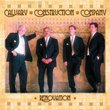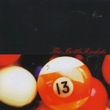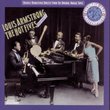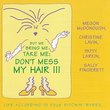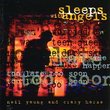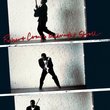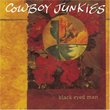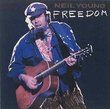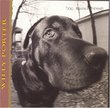| All Artists: Lonnie Johnson Title: Steppin on the Blues Members Wishing: 3 Total Copies: 0 Label: Sony Original Release Date: 8/28/1990 Re-Release Date: 8/20/1990 Genres: Country, Blues, Jazz, Pop Styles: Classic Country, Delta Blues, Traditional Blues, Acoustic Blues, Traditional Jazz & Ragtime Number of Discs: 1 SwapaCD Credits: 1 UPCs: 074644622126, 074644622119, 074644622140 |
Search - Lonnie Johnson :: Steppin on the Blues
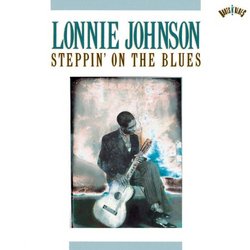 | Lonnie Johnson Steppin on the Blues Genres: Country, Blues, Jazz, Pop
Not only did Johnson pioneer single-string, blues-guitar improvisation, he still ranks as one of its greatest practitioners. His playing was remarkably fluent, sophisticated, and melodic, yet he never sacrificed emotion or... more » |
Larger Image |
CD DetailsSynopsis
Amazon.com Not only did Johnson pioneer single-string, blues-guitar improvisation, he still ranks as one of its greatest practitioners. His playing was remarkably fluent, sophisticated, and melodic, yet he never sacrificed emotion or bite. He was the first bluesman to make his mark as a virtuoso instrumentalist, despite his formidable vocals. These 19 early performances (1925-1932) include low-down blues, buoyant ragtime, and catchy hokum, plus examples of sheer instrumental wizardry. Victoria Spivey joins Johnson for the risque vocal duet "Toothache Blues" and Texas Alexander sings lead on a pair of songs, but the instrumentals inevitably remain the highlights. His two guitar duets with jazz great Eddie Lang plus his solo workout on "Playing With the Strings" are astonishing displays of technique. --Marc Greilsamer Similar CDs
Similarly Requested CDs
|
CD ReviewsRobert Johnson should have sold his soul to Lonnie D. Chang | DC | 10/12/2001 (5 out of 5 stars) "Robert Johnson, Robert Johnson, Robert Johnson. If I hear one more word about Robert Johnson I will have to hurt somebody. The man is primarily famous not for the handful of recordings he made, but for a moving but most likely fictional myth. I will give him credit for being a pretty good bluesman, but if he really wanted to learn the blues he needn't sell his immortal soul to Satan, but rather just find Mr. Lonnie Johnson. You should do the same. Lonnie Johnson was the precursor to the more famous guitar slingers from Chicago years after these recordings. One listen and you will be astounded at his clarity, the crisp, perfectly phrased lines he creates with his acoustic guitar. I definitely was. But he was also an outstanding songwriter. The blues requires a penchant for storytelling and a certain dry wit that most all other musical genres severely lack. And Lonnie had both of these qualities in spades. I cannot help but laugh and chuckle at some of the lyrics he sings with his smooth, classic crooner-style voice. Every line is truly brilliant. Make no mistake, ALL modern music, from jazz to pop, metal to hip-hop, is based on the blues. Some of them took the music and instrumentation and ran with it(pop and rock), while others took the rhythm and lyrics(r&b and hip-hop), but it can ALL be traced back to the porch steps and cotton fields of the south. Being so, Lonnie Johnson is an essential link between the old and the new. His instrumentation and guitar skill are matched, in my mind, only by the great Reverend Gary Davis, and his music is timeless. For its age, these recordings sound fantastic. You can hear every note and hum. Sometimes there is a little microphone buzz, and the piano and bass in the background are occasionally muffled, but overall an excellent recording and well worth your money." Every Blues fan needs this record Tony Thomas | SUNNY ISLES BEACH, FL USA | 10/23/2003 (5 out of 5 stars) "Lonnie Johnson was the first great blues guitarist, along with his partner Eddie Lang, he was the first great Jazz guitarist, he remained a song writer and a vocalist able to hit the charts with R & B hits well intothe late 1940s. He was class as both a jazz and blues folk revivalist when he was "refound" in the 1960s and was popular in the US, Europe, and Canada. Robert Johnson obviously studied Lonnie's Work pretty well. In fact, Robert Johnson would lie and tell people that he was a cousin of the great Lonnie. Lonnie's records sold in the hundreds of thousands into the 1940s, while Robert Johnson never sold more than 2000 records while living on any tune. Lonnie was the antithesis of the false folkie-based stereotype of a blues performer. He was a professional performer as a kid violin virtuosi in vaudville touring the world before he ever learned to play the guitar! While born in New Orleans, he based himself in Chicago and New York during his playing career Johnson was not refound in some Mississippi Cotton field, but as a janitor in Philiadelphia. he went on to open his own night club in Toronto, Canada where he was killed byu complications after an automobile accident. What we see here in these records is a master musician. The guitar playing is unbelievably good, sweet, hot,and very very clean. The singing is always on key, professional, and cuts like a razor. The richness and saltiness of the verses ios tremendous. In the 20s, Johnson once bet someone he could play and compose 300 different blues, and he did with no difficulty and recored most of them! Even without their historical importance--this is what Blues performers aspired to--the records are just fun as expression and entertainment. I would also recommend the great records Johnson made with Lil Hardin Armstrong and others in Bluebird's Chicago stables in the 1940s, as well as the Verve Folkways recordings he made in the late 1960s. Heck, I would recommend you listem to birdcalls if Lonnie Johnson had recorded them!" I Done Told You Lonnie Was Bad! Pharoah S. Wail | Inner Space | 04/12/2000 (5 out of 5 stars) "In a previous review it's pointed out that Lonnie's earliest recordings (the recordings on this cd) happened about a decade before Robert Johnson's recordings. While that is true, it's of little importance. Lonnie and Robert get compared because of their last names more than because of their music. They were two very different men with two very different musical aesthetics. Robert's name should come up during a discussion of Son House before it should come up in a discussion of Lonnie.While it's pointed out that the instrumentals steal the show here, don't discount the vocal songs. SWEET POTATO BLUES is great. Although vocally, I think the 2 best songs are the Texas Alexander songs with Lonnie on accompanying guitar. Take a listen to the two TOOTHACHE BLUES'. This is the music that was making mothers cover their childrens ears in 1928, quite risque stuff. Victoria's great voice and yearning moans surely made pre-Depression teenage male hearts go pitter-pat!Although Lonnie is thought of as a "blues guitarist" make no doubt about it, some of this stuff is the birth of what's now known as "string swing". I have no doubt that Django and Oscar Aleman were listening to Lonnie before we knew their names. On the sonic quality of the recordings... it is wonderful! If you've heard Charlie Parker stuff on Dial from the mid 1940's and the hissy, scratchy quality bothered you don't worry. Although these recordings were made almost 20 years earlier in some cases, they are better. Lonnie's gloriously strong acoustic guitar tone comes through loud and clear and his melodic solo's are a marvel even now. Because of Lonnie's innovations there are alot of people now who can play faster than he played, but few who play better than he played."
|

 Track Listings (18) - Disc #1
Track Listings (18) - Disc #1
